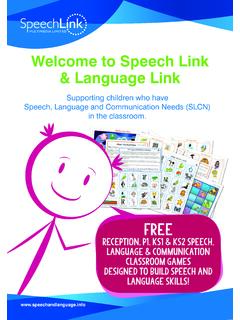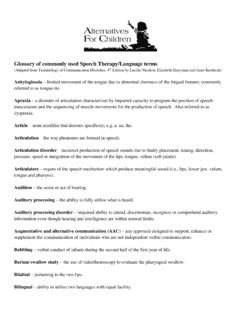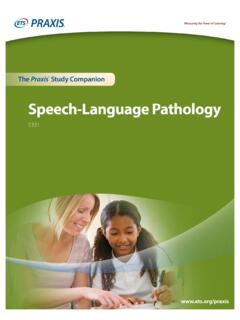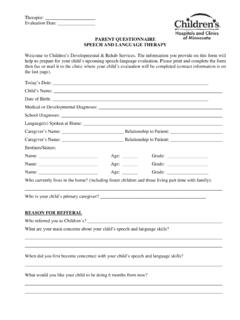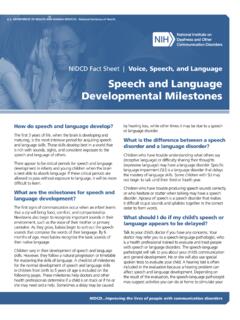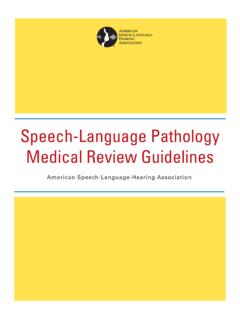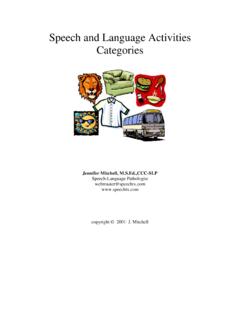Transcription of Speech-Language Pathology for Clients with Down …
1 Speech-Language Pathology for Clients with Down SyndromeKiara Matthews, MS, CCC-SLPWhat is Speech-Language Pathology ?Also known as speech (and) language a specialty field that focuses on the evaluation and treatment of communication and swallowing and adults with Down Syndrome are impacted by difficulties with hearing, feeding, speech and LossIn People with Down SyndromeHearing Loss Ear infections occur frequently in infancy and early childhood in all children. But, because of anatomic differences in the ears of children with Down syndrome (narrow and short canals), they are more susceptible to accumulations of fluid behind the eardrum.
2 This is known as Otitis Media with Effusion (OME). These problems result from fluid retention and inflammation in the middle ear; sometimes with infection. The presence of fluid makes it more difficult for the child to hear, resulting in fluctuating conductive hearing loss. Hearing Loss speech and language are learned through hearing, vision and touch. Hearing is very important to speech , and studies have shown that speech and language development are negatively affected by chronic fluid accumulation. Children with Down syndrome often have fluctuating hearing loss due to the frequency of fluid accumulation.
3 When fluid is present, hearing is affected; as fluid drains, hearing improves. When children do not consistently hear well, it is difficult for them to learn how sounds and events are related, the ring of the telephone or someone calling them. It is important for parents to ensure that their child is hearing well. speech CharacteristicsIn People with Down SyndromeSpeech Characteristics There are a wide range of abilities that children with Down syndrome demonstrate when using speech . speech intelligibility is one of the most difficult areas for people with Down syndrome at all ages.
4 Many children have difficulty with the strength, timing and coordination of muscle movements for speech . speech involves: coordinating breathing (respiration) voice (phonation) and the production of speech sounds (articulation) speech Characteristics Factors that can contribute to speech intelligibility problems include: articulation problems with specific sounds low oral-facial muscle tone difficulty with sensory processing and oral tactile feedback use of phonological processes difficulties in motor planning for speech . language CharacteristicsIn People with Down SyndromeLanguage Characteristics Some areas of language are generally more difficult for people with Down syndrome while other areas are relatively easier.
5 People with Down syndrome have strengths in the area of vocabulary and pragmatics (social interactive language ). They often develop a rich and varied vocabulary as they mature. They have good social interactive skills and use gestures and facial expressions effectively to help themselves communicate. They generally have the desire to communicate and interact with people. Syntax and morphology (including grammar, verb tenses, word roots, suffixes and prefixes) are more difficult areas, possibly because of their complex and abstract nature.
6 People with Down syndrome frequently have difficulty with grammar, tenses and word endings and use shorter sentences to Characteristics Most children with Down syndrome are able to understand much more than they can express. As a result, their test scores for receptive language are higher than for expressive language . This is known as the receptive-expressive gap. Children with Down syndrome learn well through visual means, so often reading and the use of (some) computer programs focusing on language skills can help them learn.
7 Seeing words and images associated with sounds and being able to read words can help speech and language develop. For some children, the written word can provide helpful cues when using expressive and SwallowingIn People with Down SyndromeFeeding and Swallowing speech is a secondary function that uses the same anatomic structures used for feeding and respiration. Low muscle tone (hypotonia) affects feeding and will also affect speech . In feeding, children gain practice with strengthening and coordinating the muscles that will be used for speech .
8 Feeding and Swallowing If a child has difficulty feeding, it is important that his or her parents seek guidance from a feeding specialist (a Speech-Language pathologist or occupational therapist who has advanced training). Feeding therapy can to help strengthen the oral muscles, which in turn can have a positive effect on and Swallowing -Difficulties Silent aspiration food, drink, saliva, mucous going into lungs without a cough or any attempt of expulsion Mouth is not alert or ready for feeding or eating Swallowing air leading to stomach cramps and indigestion Loss of interest in feeding/eating before meal is finished Difficulty moving on to spoon feeds and tolerating different texturesOther SkillsRelated to speech and LanguageOther Skills Related to speech and language Other important pre- speech and pre- language skills are.
9 The ability to imitate and echo sounds turn-taking skills (learned through games such as peek-a-boo) visual skills (looking at speakers and objects) auditory skills (listening to music, speech , and speech sounds for lengthening periods of time) tactile skills (learning about touch, exploring objects in the mouth) oral motor skills (using the tongue, moving the lips) and cognitive skills (understanding object permanence, and cause and effect relationships)Other Skills Related to speech and language The family can stimulate these pre- speech and language skills at home.
10 The Speech-Language pathologist can help parents learn the skills that they need to help their child begin learning language and using SettingsWhat speech and language Skills Are Needed?What speech and language Skills are Needed for Academic Settings? Parents can help by working as a team with their school personnel to develop an individualized treatment program. In school settings in the United States, the plan will be part of the IEP (Individualized Education Program). These are not formally required here in Trinidad and Tobago but most Speech-Language pathologists work to have a similar type of document created.
